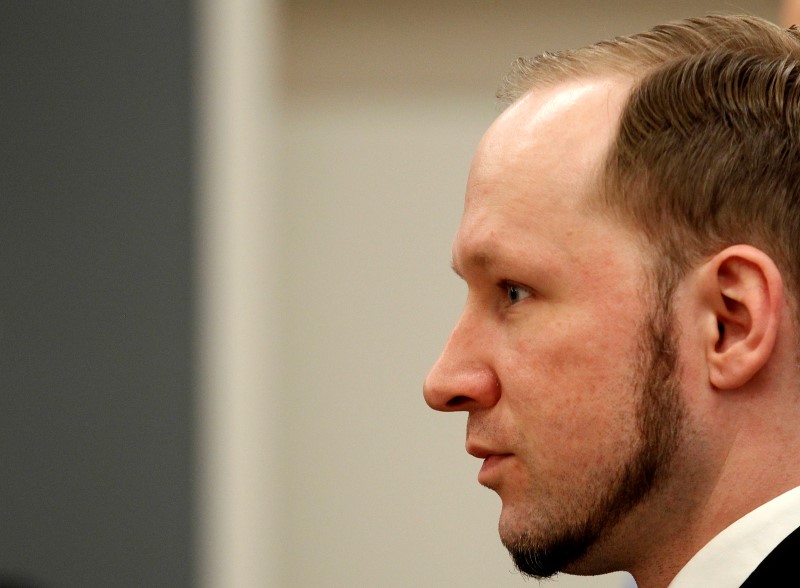By Alister Doyle
OSLO (Reuters) - Locked away in a Norwegian prison since he killed 77 people in a rampage in 2011, Anders Behring Breivik goes to court next month to argue that his effective solitary confinement makes him a victim of cruel and inhuman treatment.
The move has prompted renewed soul-searching in a country where many want to move on and forget.
Breivik killed eight people with a car bomb in Oslo then gunned down 69 people at a meeting of the Labour Party's youth wing on an island.
He is now serving a 21-year sentence, Norway's maximum, confined to a specially constructed cell with no contact with other prisoners. The term can be extended if he is still considered a threat.
"His case is so exceptional and so hard for Norwegian society that we don't know how to tackle it," headmaster Trond Lien told Reuters at Handelsgymnasium high school in Oslo, which Breivik attended in the 1990s.
Breivik's lawyer says he feels depressed and lonely because he only has access to guards, doctors and other professionals. His only visitor was his mother, whom he briefly hugged before she died of cancer in 2013.
"The core of the case is that he should be allowed to have some kind of normal human relationships," lawyer Oeystein Storrvik told Reuters.
The case is due to run from March 15-18 when Breivik will accuse the state of cruel and inhuman punishment.
Storrvik says the rules are so harsh that they violate the European Convention on Human Rights. He says he knows of no precedent for someone being held in isolation so long in Norway.
The Norwegian Correctional Service says the conditions are as liberal as possible for an unrepentant right-wing fanatic and anti-Muslim killer who risks being attacked if he mixes with other inmates.
Storrvik said Breivik, now aged 36, simply wants a chance to discuss his ideas with other people. He would like to exchange letters and perhaps receive visits. His letters are now subject to heavy censorship, for fear of conspiracy.
The Correctional Service denies Breivik is held in solitary confinement, preferring the phrase "excluded from the company of other prisoners". There is no maximum time for how long he can be held in such "extra high security", service official Atle Syvertsen said.
In one of the jails in which he has been held, he has three rooms - one to sleep, a second for study and a third for exercise. Each measures about eight sq. metres (86 square feet).
CENSORSHIP
A report by Norway's civil ombudsman last year said the conditions were so strict that it represented "an elevated risk of inhumane treatment".
Yuval Ginbar, a legal advisor for Amnesty International, said Norway should ensure that all prisoners get "daily, meaningful human contact lasting over 2 hours". Anything less amounts to solitary confinement, he said.
Contact could include interaction with prisoners, staff or outside people during work, education or other activities, he said.
Amnesty often criticises solitary confinement, usually used for those seen as the most violent inmates. A sample of 110 prisoners held in super maximum security in the United States showed they had been held isolated for an average of 8.2 years, it said.
Breivik has a personal computer but no Internet access and is studying international relations at Oslo University by post.
The trial will be held in the gym at Skien prison, south of Oslo, to avoid having to transport Breivik to court in the capital.
Norway has one of the world's most liberal prison systems and one of the lowest numbers of detainees - 71 per 100,000 people compared to 698 in the United States, according to the London-based Institute for Criminal Policy Research.
In Oslo, headmaster Lien faced a dilemma after the killings in July 2011 - one of the dead was a female student at the Handelsgymnasium school.
He unscrewed the photograph of the class of 1998 from a wall, with black and white pictures of about 150 students including Breivik, and stashed it in his office.
A couple of years later, Lien decided to edit out Breivik's face before hanging the picture up again. Breivik left the school months before finishing so did not qualify for the graduation photo, he argued.

"On reflection, it may have been the wrong decision," he said, saying it was a sad historical fact that Breivik had attended the school. "No decision would have been right."